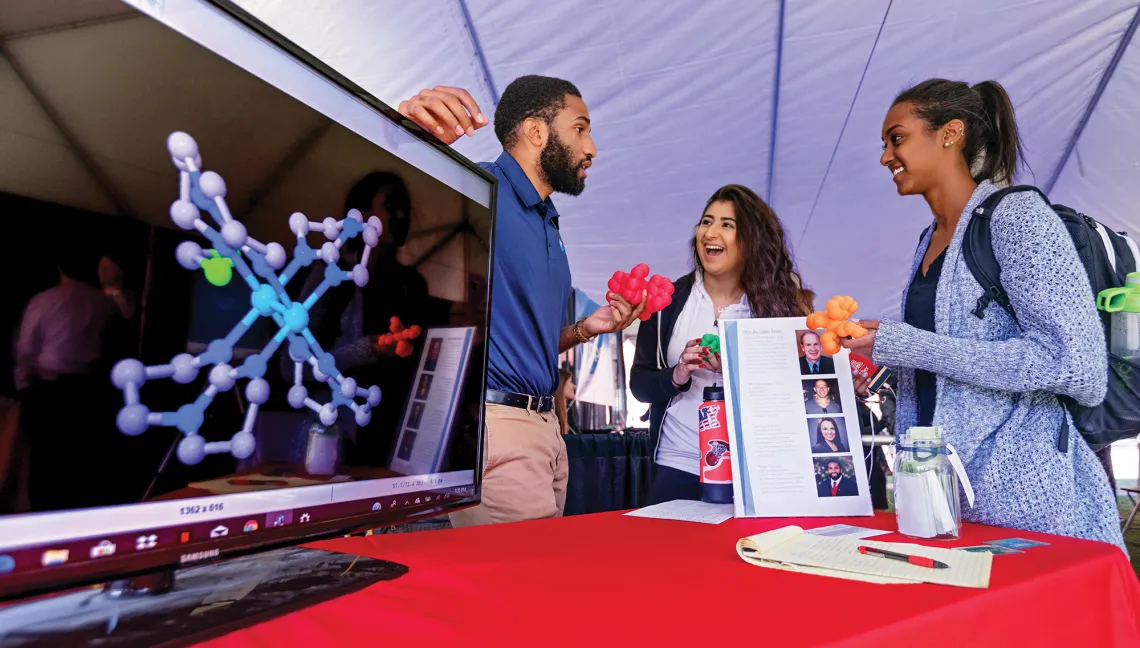Social Entrepreneurship Hub
Amid the profits, social innovation mixes with business development to serve community

From left: UA senior Tripp Twyman explains the science behind the startup Algoe Chemicals to Kimya Dastoori and Riem Kidane at the 2018 McGuire Innovation Expo.
She steps up to the podium, looking crisp, like a CEO in the making, in a white blazer, while others in the class sport T-shirts and shorts.
“We are the Eller Think Tank team,” Katie Alhadeff proclaims. The 20 other students stop doodling. They sit up, put down their phones and listen.
Turning serious, Alhadeff states the social problem her team selected. Although the Eller College of Management is already a top U.S. business college, her team had to propose a way, in theory, to improve it. They designed an in-house academic-help center.
Alhadeff, a senior, asks her team to describe their plans, complete with budgets, revenue projections and sustainable impacts.
This was one of the team presentations in MGMT 380, Social Innovation Organizations, part of an emphasis at Eller’s McGuire Center for Entrepreneurship on innovating for social impact.
In May 2017, McGuire issued its first Social Innovation Certificate, or SIC. Business majors like Alhadeff can earn the designation on their transcripts, signaling to employers that they could start or run a company that can make a difference, not just a profit. Twenty-five students are in line to earn the certificate.
To get the SIC, students must complete nine units in small-business development and consulting, social innovation, nonprofit consulting, management of effective nonprofit organizations, or social entrepreneurship.
It’s the only program of its kind in the U.S. with a fully local focus, says its director, Cindi Gilliland, an Eller professor of management and organizations. Others stress hypothetical problems or national issues, while McGuire Center student teams work on a real social or environmental need in the Tucson region.
One team started an animal welfare coalition that obtained a $2 million grant for spay-and-neuter work in a zone hard-hit with strays. Another worked on refugee resettlement in Pima County, creating resume workshops for job seekers and fixing bicycles to take them to job sites.
Gilliland, who began offering social impact projects in her organizational behavior class in 2007, says that more businesses are realizing that social impacts are good business. “They’re looking to make cleaner, greener products and help people at the bottom of the pyramid, getting away from leaving that to charity where the rich give to the poor. Businesses are finding they can increase market share by doing the right thing, by leveraging the market and nonmarket benefits of a company.”
In 2016, the new director of the McGuire Center for Entrepreneurship, Remy Arteaga, recognized the certificate’s value as soon as he arrived. He wanted to nurture the MGMT 380 emphasis on putting business skills to work in nonprofits. “I call them ‘common-good’ organizations,” he says. “They should be known by their work, not their structure.”
From the start, he insisted that social-impact courses were central to McGuire, a 33-year-old center within Eller. “There are very few options for those working in bringing about greater common good to enhance their knowledge, skills and mindset. The mindset to bring about change and manage uncertainty is critical to solving some of the world’s biggest problems.”
Word is spreading fast about the program. Eller has had an outpouring of interest in their Nonprofit Leadership Certificate this spring, with 84 applicants from local nonprofits and space for just 48 people.
While these social impact offerings are new as formal educational tracks for the McGuire Center, the long established New Venture Development Program — a year-long, hands-on program that empowers student teams to build new ventures from the ground up — has been helping students launch common-good businesses for years.
To round out its social entrepreneurship programs, Eller launched its new public-private partnership with Impact Hub San Francisco at an event in early March. Eller will deliver graduate-level social impact entrepreneurship education to the members of Impact Hub’s purpose-driven coworking community. Matt Van Horn ’06, who cofounded the ride-sharing company now called Lyft as well as the June smart oven, was part of a panel discussion at the event.
